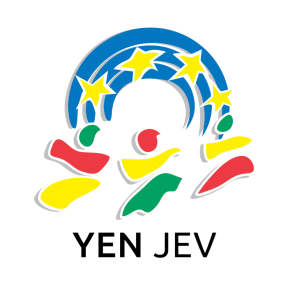History
We – the Youth of European Nationalities – were established 1984 as an independent, international, non-governmental youth organisation (INGYO), which is recognized and supported by the Council of Europe and the European Union.
On April, 16th in 1984 the Youth Committee of the Federal Union of European Nationalities (FUEN) was dissolved and the “Youth of European Nationalities” (YEN) was founded as an independent organization on the Knivsberg in Northern Schleswig (Danmark).
Since 1963/64, a Youth Committee was existing within FUEN. Chairman were inter alia Pierre Le Moine, Armin Nickelsen and Heinrich Schultz.
In 1963, during a congress of the FUEN in Aosta / Italy this Youth Committee was founded. In the following year the first meeting took place. This was the basis for what would become the traditional Annual Congress, the Easter Seminar.
The traditional YEN Easter Seminar is existing since nearly 50 years.
The first congress of the Youth Committee was held in 1965 in Flensburg, Germany and became a huge success with 25 Nationalities represented.
After the political changes in Europe 1989/1990 the YEN deals actively with political questions about European minority protection and the protection of minorities in Eastern Europe.
Since the political changes, YEN is growing steadily. Although briefly a geographical separation of the organization was conceived, YEN formulated quickly the objective to include all minorities in Europe.
1996 was held the first Youth Leader Seminar, which became an inherent part of the organization. In this time, YEN defined its basic principles and the main aim: to be a dynamic and vibrant network of youth organizations of the autochthonous minorities in Europe.
Institutionalization of YEN
The following years were marked by growth and an increasing profile. The next step was the establishment of an own office with permanent staff. Today the organization has 1.25 permanent staff members who run the office in Berlin.
YEN enters the European political arena
Since 2000, YEN reinforces its European commitment by participating in international conferences and seminars.
In April 2010, the YEN has been accepted as a full member of the European Youth Forum (YFJ). The YFJ is an independent, democratic, youth-led platform, representing 99 National Youth Councils and International Youth Organisations from across Europe. In May 2015, at the Council of Members (CoMem) of the YFJ, YEN was for the first time in its history, elected to the Advisory Council on Youth of the Council of Europe, for a term of 2 years starting in January 2016. YEN has been re-elected for another 2-year term until 2020.
In May 2012, YEN has applied for a consultative status at the Economic and Social Council of the United Nations (UN ECOSOC). The ECOSOC-status was granted to YEN in 2016.
The common goals of FUEN and YEN still connect both organisations. YEN is corresponding member of FUEN and holds a seat in the board of FUEN. Moreover, both organizations are partners in EU projects. From January 2009 till December 2011 the European Commission was funding the Network for multilingualism and linguistic diversity in Europe (RML2future).
Also in the follow-up project under the direction of FUEN – www.language-diversity.eu – YEN is a strong partner. A big success was the EUROPEADA 2012 – the Football Tournament of the autochthonous, national minorities in Europe – at the Lusatian Sorbs as well as in South Tyrol in 2016.
Today, the Youth of European Nationalities (YEN) has 40 members, and therefore is the largest union of European youth organisations representing the ethnic, linguistic and national minorities of Europe.
YEN Presidents
Before YEN‘s foundation
1963-1965 Ossi Böse, Sudetendeutscher / Sudeten-German
1965-1966 Wilhelm Klüver, Südschleswiger / Dane from Germany
1966-1967 Pierre Lemoine, Bretone / Breton
1967-1969 Armin Nickelsen, Nordschleswiger /German from Denmark
1969-1971 Erich Kukuk, Sudetendeutscher / Sudeten-German
1971-1974 Filip Warasch, Kärntner Slowene / Carinthian Slovene
1974-1979 Heinrich Schultz, Südschleswiger / Dane from Germany
1979-1982 Jurica Csenar, Burgenlandkroate / Burgenland Croat
1982-1986 Christel Petersen, Nordfriesin / North-Frisian
After the foundation of YEN in 1984
1984-1986 Christel Petersen, Nordfriesin / North-Frisian
1986-1989 Jon Domenic Parolini, Rhätoromane / Rhaetian
1989-1990 Julius Mühlögger, Südtiroler / South-Tyrolean
1990-1992 Duri Denoth, Rhätoromane / Rhaetian
1992-1994 André Goebels, Deutschbelgier / German-speaking Belgian
1994-1996 Roland Feichter, Südtiroler / South-Tyrolean
1996-1998 Adelgaard Willemsma, Westfriesin / West-Frisian
1998-2000 Matti Lukinen, Finne aus Schweden / Finn from Sweden
2000-2002 Anne Hahn, Nordfriesin / North-Frisian
2002-2003 Jan Diedrichsen, Nordschleswiger / German from Denmark
2003-2006 Stephan Kleinschmidt, Nordschleswiger / German from Denmark
2006-2008 Aleksander Studen-Kirchner, Slowene / Slovene
2008-2010 Hester Knol, Westfriesin / West-Frisian
2010-2012 Sebastian Seehauser, Südtiroler / South-Tyrolean
2012 – 2014Fatma Reşit, West-Thrakien Türkin / Western Thrace Turk
2014-2016 Matic Germovšek Žnidaršič, Kärntner Slowene / Carinthian Slovenian
2016 – 2018 Britta Lessow Tästensen, Nordschleswigerin / German from Denmark
2018 – today Giuanna Beeli, Rätoromanin / Romansh from Switzerland
